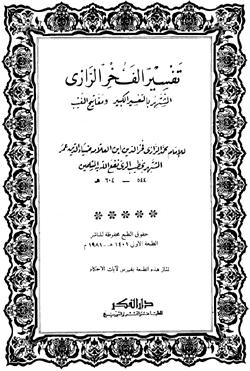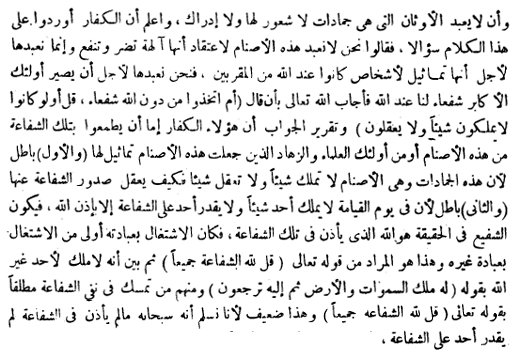| Monday, 02 February 2026 Home • About Us • Contact Us |
 | |
|
|
|
You are here:
Home /
Topics
/
Shafaa'ah
Mail to a Friend • Printer friendly 
Background and Introduction
Historically, the innovations of the first century were light innovations (Khawarij, Shi'ah, Qadariyyah, Murji'ah), in that they did not directly relate to Allaah Himself. Those that came in the second century hijrah were more severe in that they related directly to the belief in Allaah Himself (His Names, Attributes, His Uluww, His Speech), and then from this period the introduction of philosophy and gnosticism (mystical esoteric knowledge) led to further deviations. However, it took around six centuries for shirk (associationism) to spread amongst the Muslims on a wide scale. The seeds of this shirk were spread initially by the Ismaa'eelee Baatiniyyah known as Ikhwan al-Safaa (Brethren of Purity) in the third and fourth centuries, and they were given support by the Ubaidiyyah (Shii'ite rulers of Egypt) when they took power. Prior to this time (before the fifth century, i.e. 400H), whilst the variuos sects had deviations in issues of aqidah, the understanding of Tawhid al-Ibaadah was still relatively firm.
This shows that the greater deviations occurred when the people were further away from the era of revelation, and this is simply a cycle of history. This has always occurred after the sending of Prophets and Messengers, and it is indicated in the Prophetic texts for this ummah, such as those texts that mention that this (Muslim) nation will follow the footsteps of those (nations) that came before them (such as the Jews and Christians). For this reason, the greatest deviation, shirk with Allaah, was the last of the affairs to enter into the Ummah - long after the era of Prophethood.
Coming to the subject of this series of articles now, we present in this some quotations from the Tafseer of ar-Razi pertaining to the core arguments for the justification of supplicating to those besides Allaah and seeking their intercession, and through this we illustrate that this type of refutation against the grave and saint worshippers precedes Ibn Taymiyyah (rahimahullaah) by a century and Ibn Abdul-Wahhaab (rahimahullaah) by six centuries, and it also uncovers the academic and intellectual fraud of today's grave and saint-worshippers against the Scholars of Tawheed.
Fakhr ud-Din ar-Razi on The Prophets and Righteous as intermediaries From Whom intercession is Sought
In the (first part) of this series (see here), it was established that ar-Razi showed rejection against those who venerate the graves, seeking to win the intercession of the righteous dead, and he stated that this is rebutted by the Qur'an. Here is his statement quoted previously, and it is in reference to the saying of Allaah, "And they worship besides Allah things that hurt them not, nor profit them, and they say: "These are our intercessors with Allah"." which is in Surah Yunus (10:18), he wrote:
ونظيره في هذا الزمان اشتغال كثير من الخلق بتعظيم قبور الأكابر على اعتقاد أنهم إذا عظموا قبورهم فانهم يكونون شفعاء لهم عند الله
Please refer to (Part 1) for the full context of the above quotation, because ar-Razi has stated that this action is equivalent to the practice of the idolators. In this article we are going to take a look at ar-Razi's explanation of the reasoning of those who worship the Prophets and the righteous in falsehood, soliciting them directly for intercession. Keep in mind the above quote from ar-Razi when reading through what follows and you will understand the true nature of the Tawhid of the Messengers. Ar-Razi is commenting upon the verses:
 أَمِ اتَّخَذُوا مِن دُونِ اللَّهِ شُفَعَاء قُلْ أَوَلَوْ كَانُوا لَا يَمْلِكُونَ شَيْئًا وَلَا يَعْقِلُونَ. قُل لِّلَّهِ الشَّفَاعَةُ جَمِيعًا لَّهُ مُلْكُ السَّمَاوَاتِ وَالْأَرْضِ ثُمَّ إِلَيْهِ تُرْجَعُونَ أَمِ اتَّخَذُوا مِن دُونِ اللَّهِ شُفَعَاء قُلْ أَوَلَوْ كَانُوا لَا يَمْلِكُونَ شَيْئًا وَلَا يَعْقِلُونَ. قُل لِّلَّهِ الشَّفَاعَةُ جَمِيعًا لَّهُ مُلْكُ السَّمَاوَاتِ وَالْأَرْضِ ثُمَّ إِلَيْهِ تُرْجَعُونَ 
Ar-Razi writes (Tafsir ar-Razi 26/285):
Now pay attention to this next part, and it would be a good idea if you go and read this article first before continuing with the rest of this quote from ar-Razi:
This really is an amazing piece here, and again, if the name of ar-Razi had not been mentioned, you would have thought this is a passage straight out of Shaykh ul-Islam Ibn Abdul-Wahhaab's "Kashf ush-Shubuhaat". And what we have here is corroboration of the fact that what is done by the grave-worshippers and saint-worshippers of soliciting the intercession of those who are dead, by venerating their graves, calling upon them directly, then all of this is very shirk that Allaah condemned in His Book, and it was this shirk that the Messenger was sent to abolish and fight against. And these idols, it was not believed about them that they have control over benefit or harm, and nor was it believed that they can make intercession, but as is the case with the majority of this type of shirk, these idols simply serve as tangible representations and as focal points for those that are not directly present (the righteous dead, the angels, the heavenly spirits and so on), so that solicitations can be made through these things to those righteous people, with the hope of winning their intercession. And this is what takes place with the graves and tombs where a variety of types of worship and devotion, inward and outward is shown by people who flock there, hoping for intercession and relief. Shaykh ul-Islam Muhammad bin Abdul-Wahhaab on This Subject Now compare the above statements of ar-Razi which were written around six hundred years before Shaykh ul-Islam Muhammad bin Abdul-Wahhaab with what is found in the book "Kashf ush-Shubuhaat" (Removal of the Doubts), of the latter:
اعلم رحمك الله أن التوحيد هو إفراد الله بالعبادة، وهو دين الرسل الذي أرسلهم الله به إلى عباده. فأولهم نوح عليه السلام أرسله الله إلى قومه لما غلوا في الصالحين وداً وسواعاً ويغوث ويعوق ونسراً، وآخر الرسل محمد ، وهو الذي كسر صور هؤلاء الصالحين، أرسله إلى قوم يتعبدون ويحجون ويتصدقون ويذكرون الله كثيراً، ولكنهم يجعلون بعض المخلوقات وسائط بينهم وبين الله. يقولون: نريد منهم التقرب إلى الله ، ونريد شفاعتهم عنده؛ مثل الملائكة، وعيسى، ومريم، وأناس غيرهم من الصالحين
ثم منهم من يدعو الملائكة لأجل صلاحهم وقربهم من الله ليشفعوا له، أو يدعوا رجلاً صالحاً مثل اللات: أو نبياً مثل عيسى وعرفت أن رسول الله ، قاتلهم على هذا الشرك ودعاهم إلى إخلاص العبادة لله وحده كما قال تعالى: وَأَنَّ الْمَسَاجِدَ لِلَّهِ فَلَا تَدْعُوا مَعَ اللَّهِ أَحَداً [الجن:18] وقال: لَهُ دَعْوَةُ الْحَقِّ وَالَّذِينَ يَدْعُونَ مِن دُونِهِ لاَ يَسْتَجِيبُونَ لَهُم بِشَيْءٍ [الرعد:14]، وتحققت أن رسول الله قاتلهم ليكون الدعاء كله لله، والنذر كله لله، والذبح كله لله، والاستغاثة كلها لله، وجميع أنواع العبادات كلها لله، وعرفت أن إقرارهم بتوحيد الربوبية لم يدخلهم في الإسلام، وأن قصدهم الملائكة أو الأنبياء، أو الأولياء، يريدون شفاعتهم، والتقرب إلى الله بذلك هو الذي أحل دماءهم وأموالهم، عرفت حينئذٍ التوحيد الذي دعت إليه الرسل، وأبى عن الإقرار به المشركون، وهذا التوحيد هو معنى قولك: لا إله إلا الله فإن الإله هو الذي يقصد لأجل هذه الأمور، سواء ملكاً، أو نبياً، أو ولياً، أو شجرة، أو قبراً، أو جنياً لم يريدوا أن الإله هو الخالق الرازق المدبر، فإنهم يعلمون أن ذلك لله وحده كما قدمت لك
فإن قال أتنكر شفاعة رسول الله وتبرأ منها فقل: لا أنكرها ولا أتبرأ منها، بل هو الشافع والمشفع وأرجو شفاعته، ولكن الشفاعة كلها لله كما قال تعالى: قُل لِّلَّهِ الشَّفَاعَةُ جَمِيعاً [الزمر:44] ولا تكون إلا من بعد إذن الله كما قال عز وجل: مَن ذَا الَّذِي يَشْفَعُ عِنْدَهُ إِلاَّ بِإِذْنِهِ [البقرة:255]، ولا يشفع في أحد إلا من بعد أن يأذن الله فيه كما قال عز وجل: وَلَا يَشْفَعُونَ إِلَّا لِمَنِ ارْتَضَى [الأنبياء:28]، وهو لا يرضى إلا التوحيد كما قال تعالى: وَمَن يَبْتَغِ غَيْرَ الإِسْلاَمِ دِيناً فَلَن يُقْبَلَ مِنْهُ [آل عمران:85]، فإذا كانت الشفاعة كلها لله ولا تكون إلا بعد إذنه ولا يشفع النبي ولا غيره في أحدٍ حتى ياذن الله فيه، ولا يأذن إلا لأهل التوحيد بين لك أن الشفاعة كلها لله، وأطلبها منه، وأقول: اللهم لا تحرمني شفاعته، اللهم شفعه في، وأمثال هذا
These are just some samples indicating there is perfect similarity in the meaning being conveyed in the words of Shaykh ul-Islam Ibn Abdul-Wahhaab and those of Fakhr ud-Din ar-Razi, and you really have to read the words of Fakhr ud-Din ar-Razi a few times for you to realize that indeed, what Shaykh ul-Islam Ibn Taymiyyah brought and what Shaykh ul-Islam Ibn Abdul-Wahhaab brought was nothing but a revival of the deen of the Messengers pertaining to Allaah's sole right of being worshipped alone. This is alongside our acknowledgement that the likes of ar-Razi had strayed in other areas, such as in Allaah's Names and Attributes and on the subject of His being above the heaven, above His Throne and other issues of creed. And it was in his time that the worship of the righteous dead began to take momentum, which would come to plague the later ones in the time of Shaykh ul-Islam Ibn Taymiyyah and thereafter. And these later people began to try to justify this type of worship of the righteous dead in ways that will be covered in other articles inshaa'Allaah.
Link to this article: Show: HTML Link • Full Link • Short Link Related Articles:
You must be registered and logged in to comment. |
|
|
© TawhidFirst.Com. All rights reserved.
|
 To the right is a cover page for the book "Tafsir ar-Razi", also known as "Mafaateeh al-Ghayb" belonging to
To the right is a cover page for the book "Tafsir ar-Razi", also known as "Mafaateeh al-Ghayb" belonging to  And the equivalent of this in our time is the occupation of many of the creation with the veneration of the graves of the senior [righteous] ones, upon the belief that when they venerate their graves, then they (the deceased) will become intercessors for them with Allaah.
And the equivalent of this in our time is the occupation of many of the creation with the veneration of the graves of the senior [righteous] ones, upon the belief that when they venerate their graves, then they (the deceased) will become intercessors for them with Allaah.